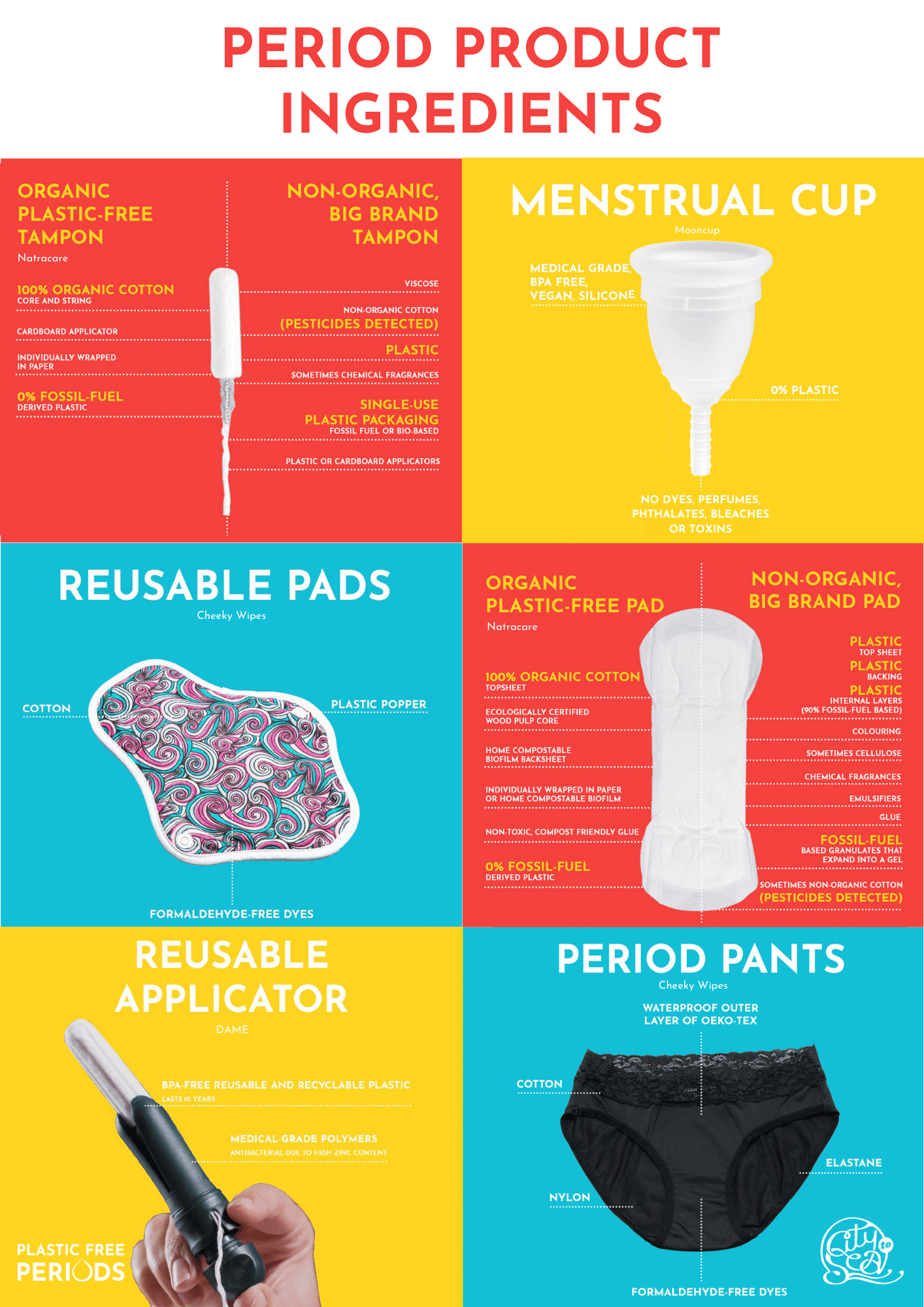The hidden ingredients
in our period products
Think you know what’s in your period products? Think again!
In 2020, Women Engage for a Common Future released a shocking new report unveiling the true ingredients of big-brand, non-organic tampons and pads. The results are not pretty – the ‘Toxic-Free Period’ report found that many of these products contain pesticide residues, fragrances and plasticizers.
Firstly – yuck, secondly, you may be asking ‘what on earth are those things?’… we’re here to tell you more!
The hidden ingredients

Pesticide residues
Pesticide residues originate from non-organic cotton (and other non-organic plants) where chemicals are sprayed on crops to kill any creatures that may interfere with farming.
Plasticizers
Plasticizers are materials that are added to other materials to make them more soft and flexible. Bisphenol A (BPA), parabens and Phthalates are common plasticisers that are known to mimic hormones, especially oestrogen. With one pack of pads containing the same amount of plastic as 5 carrier bags, and even a tampon being 6% plastic, that is a lot of plasticizer being used next to, or inside our bodies.
Fragrances
Fragrances are perfumes added to period products to make them ‘smell nice’, but often have the opposite effect. Chemical fragrances can interfere with the pH balance in the vagina, as well as the balance between good and bad bacteria which help the vagina to stay clean. This can lead to irritation and infection, which in turn may produce more odour! Often the ‘smell’ we associate with periods is actually due to the mixture of oxidised blood (blood out of the body) mixing with these perfumes.
All of these chemicals are known to disrupt the endocrine system (EDC’s), which is instrumental in regulating mood, growth and development and reproduction. We don’t know about you, but after learning this we do not feel like using these products by a highly absorbent area of our body!
What’s even more outrageous is that whilst food and cosmetic manufacturers are required by law to state what the ingredients of their products are on packaging, this is not the case for period product manufacturers. So as you can see from our new video, this information comes as a big shock to most of the population.
Do you know what’s in your period products?
“Its staggering to think we still do not know exactly what menstrual products are made of or what toxic chemicals they might contain. Independent research has detected the presence of toxic chemicals which can mimic our hormones ie Endocrine Disrupting Chemicals (EDCs) or are linked to cancer or reproductive disorders. And detected plastics which can leach toxic chemicals and ultimately pollute our environment and harm wildlife. They have no place in products used daily in one of the most absorbent of places, our vaginas.”
HEALTH-FRIENDLY, ECO-FRIENDLY PERIODS FOR ALL

Whoever you are, wherever you live, we believe that you deserve to have access to, and education about, period products that don’t harm your health or the planet.
This may all sound very depressing, but the good news is that we’re on a mission to raise awareness about the problems with outdated products, and make modern alternatives more accessible to all. And luckily for us, it’s now easier than ever before!
Since the start of 2019 at least thirteen new plastic-free period products have added across nine major retailers, including menstrual cups, period pants, washable pads, reusable tampon applicators.
And the cherry on top – by switching to a reusable period product you can save up to 94% of what you would have spent on single-use tampons and pads over your menstruating lifetime!
Of course, not everyone can afford the up-front cost of eco-friendly, health-friendly products, so getting these into people’s hands (alongside education on how to use them) through schools, universities, community groups, the NHS, or ideally the Government, is vital. Find out more about the social context of plastic-free periods.
Whilst it’s early days for extensive research into menstrual health and the effects of plastic on the human body, one thing is for sure. There are now better ways to have a period than we were told as kids – less risky for our bodies, easier on the wallet and far better for the planet. Three cheers for #PlasticFreePeriods!
Take action
- To find out what ingredients are in the full range of period products check out our Ingredients Guide
- To learn more about eco-friendly, health-friendly period products, check out our Products Page, including our guide, video and FAQ’s.
- To see what’s available in the major retailers online stores use our retailer guide.
- Share our video – since the manufacturers aren’t required to tell us what’s in their products, let’s spread the word ourselves! Help to empower others to make informed decisions about their health and the planet.
- Sign the petition, from our official partners Natracare, and Wen calling for better labelling of period products.

